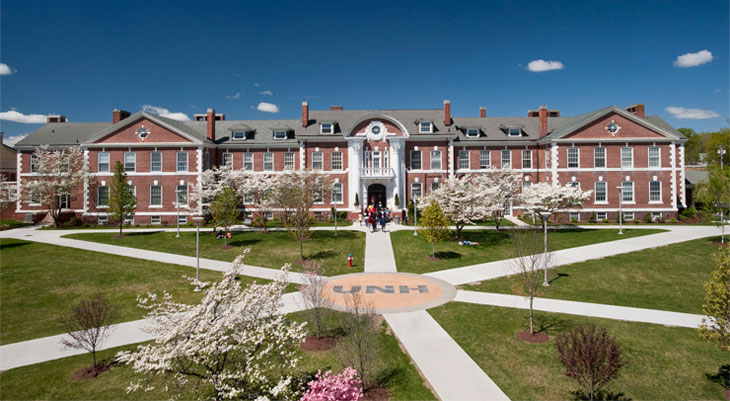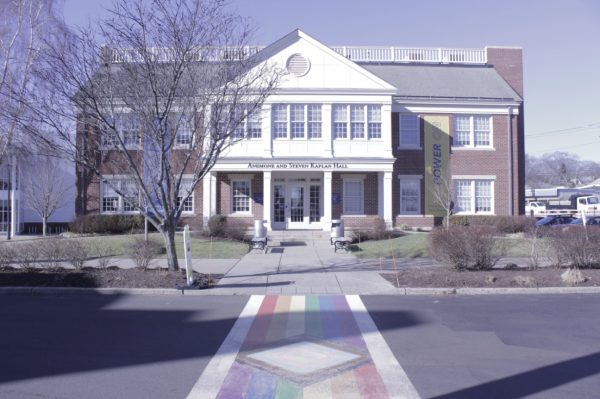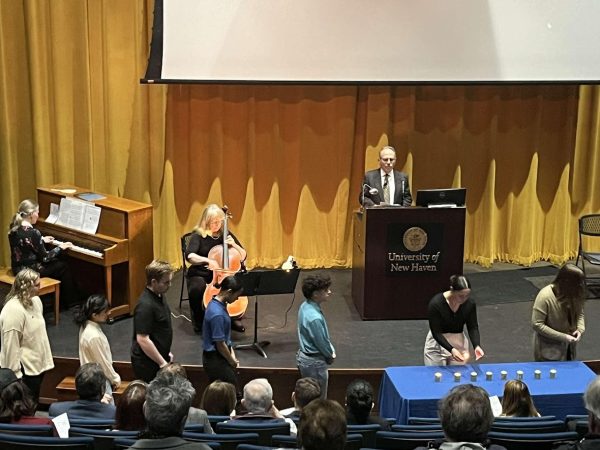A Student’s Controversial Comments Ignite Potential Change on Campus
As passionate crowds take to the streets to protest the death of George Floyd and those affected by police brutality in the United States, the University of New Haven is taking action against a class of 2020 student’s controversial comments to an anonymous source on Instagram.
According to a June 6 email from Pres. Steven Kaplan, the university suspended the student’s acceptance into the University of New Haven’s graduate program, suspended her athletic eligibility at the university, and prohibited her from participating in the online and in-person class of 2020 graduation ceremonies, after the student’s controversial direct message exchange with a student, who asked to remain anonymous. Her message was in response to a photo posted to his Instagram story. She said she does not believe that white privilege exists and that the student who posted about Floyd’s death should educate himself.
The post from the anonymous student’s Instagram story depicted the death of Floyd, along with football quarterback Colin Kaepernick kneeling during the national anthem, with a caption explaining that police brutality is why people protest.
The class of 2020 student responded to his post and asked the anonymous student to explain its meaning. Voice and text messages escalated between the two as the graduate-to-be expressed opposing views about the first student’s opinions on the death of Floyd.
Senior communication major, Khaaliq “Leeky” Crowder, first shared parts of the text exchange to his Instagram.
As the messages and audio continued to circulate, messages, and audio, students have taken a call to action.
The student, who asked not to be named, said in an interview, “I’m in disbelief and I’m just, like, disgusted on somebody to say this type of stuff.”
“I hope she realizes what she’s done,” said the student, “and, to be honest, I just want an apology about what she said. It’s just not right.”
Crowder, who first shared the text and audio exchange on his Instagram page, wrote, “There are a lot of racist/educated white folks who graduated and still go to [University of New Haven] for [criminal justice] who may very well take their racist and apathetic behavior to the workplace if no one puts a stop to it.”
A rising senior and forensic psychology major and member of the university’s NAACP, Chynna Blair, said: “It shocked me how someone could spend 4 years at a university majoring in criminal justice and still be so in the dark about white privilege, police brutality, and the stereotypes surrounding the Black Lives Matter movement and race.”
However, some students said that they were not surprised by the comments made by the class of 2020 student.
Arieliz Soto, a senior criminal justice major and member of the university NAACP, said that she “was baffled, but at the same time not surprised. There are so many people who think like [the graduate-to-be], but the difference is that she actually had the audacity to say it to a black person.”
Jennifer Edwards, a rising senior forensic science major and member of the university NAACP, said, “The campus has been known primarily for its criminal justice program, yet [it is not] mandatory for those students to be educated about diversity and inclusion as well as the rest of the university’s students.”
Students created a petition to have the student’s criminal justice degree revoked.
On May 29, Kaplan sent an email to the university community that said:
“As a University community, we have zero tolerance for any issues of hate, racism, and bigotry. Views of that nature are abhorrent and contemptible, and they do not in any way represent the ideals of our University community.”
Kaplan also said Rebecca Johnson, dean of students and vice president of student affairs, would conduct an investigation.
Following the announcement of the investigation, the university’s athletic director, Sheahon Zenger, said that he was “talking with our athletic community daily about these issues and look forward to working with university leadership to effect real change.”
But some students think the university should do more. Kaela Bazemore, a rising senior criminal justice major and member of the university NAACP, said, “This issue also shows a flaw in not only our criminal justice course but in our academic course. In four years of education, there are students who still come out ignorant and hateful. We do not teach compassion for other ethnicities and races.”
In an email from Jun. 7, Kaplan said that he met with members from the student-led group, OrganizeUNewHaven, and Lorenzo Boyd, director of the university’s Center for Advanced Policing and assistant provost of diversity and inclusion to promote their message of “inclusion, diversity, equity, and access for the University of New Haven community.”
In another email the same day, Kaplan said that school leadership is determining ways to incorporate required diversity classes into the curriculum and is also searching for someone to fill the position of a chief diversity officer.
According to Kaplan, the university’s leadership team has a deadline to diversify the faculty and staff in order for it to be more representative of the students that they teach.














